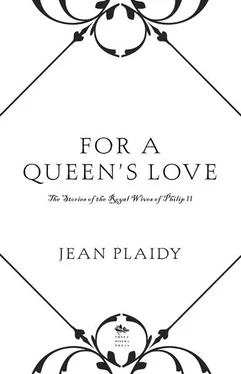Jean Plaidy - For a Queen's Love - The Stories of the Royal Wives of Philip II
Здесь есть возможность читать онлайн «Jean Plaidy - For a Queen's Love - The Stories of the Royal Wives of Philip II» весь текст электронной книги совершенно бесплатно (целиком полную версию без сокращений). В некоторых случаях можно слушать аудио, скачать через торрент в формате fb2 и присутствует краткое содержание. Жанр: Старинная литература, на русском языке. Описание произведения, (предисловие) а так же отзывы посетителей доступны на портале библиотеки ЛибКат.
- Название:For a Queen's Love: The Stories of the Royal Wives of Philip II
- Автор:
- Жанр:
- Год:неизвестен
- ISBN:нет данных
- Рейтинг книги:5 / 5. Голосов: 1
-
Избранное:Добавить в избранное
- Отзывы:
-
Ваша оценка:
- 100
- 1
- 2
- 3
- 4
- 5
For a Queen's Love: The Stories of the Royal Wives of Philip II: краткое содержание, описание и аннотация
Предлагаем к чтению аннотацию, описание, краткое содержание или предисловие (зависит от того, что написал сам автор книги «For a Queen's Love: The Stories of the Royal Wives of Philip II»). Если вы не нашли необходимую информацию о книге — напишите в комментариях, мы постараемся отыскать её.
For a Queen's Love: The Stories of the Royal Wives of Philip II — читать онлайн бесплатно полную книгу (весь текст) целиком
Ниже представлен текст книги, разбитый по страницам. Система сохранения места последней прочитанной страницы, позволяет с удобством читать онлайн бесплатно книгу «For a Queen's Love: The Stories of the Royal Wives of Philip II», без необходимости каждый раз заново искать на чём Вы остановились. Поставьте закладку, и сможете в любой момент перейти на страницу, на которой закончили чтение.
Интервал:
Закладка:
There was silence in the room. One of the candles had gone out. He put his head against her ill-smelling gown, but he did not mind the smell. He was excited because he and she were the only sane people in a mad world.
“Great-grandmother,” he whispered; but she did not answer; the effort of talking so much had tired her and she had fallen asleep.
He sat there for a long time. He did not want to leave her. He and she had much to say to each other; but after a while he, too, fell asleep; and he lay against her, keeping his hand in hers.
The guards looked in, as they did periodically, to see that all was well.
She awoke and immediately was aware of the boy on the stool at her feet. There was queenly dignity in her voice as she said: “Don Carlos visited me. We talked and he grew tired. Carry him back to his apartments and carry him gently. Do not wake him. He is but a child.”
And the guards, who were never surprised at what she might do or say, bowed low, and one of them picked up the sleeping boy and with him went quietly out of the room.
The next day the brilliant cavalcade set out on its journey to the coast.
Carlos, riding beside his father, hated him more than ever. Carlos did not want to ride with his father; he wished to stay with his great-grandmother in Tordesillas. But he was quieter than usual and he did not make his wishes known. He believed that his father was going among savages who—if he managed to survive the terrible sea journey—would make short work of him.
At Santiago de Compostella, the procession halted. There they must stay for several days that Philip might pay his respectful devotion at the shrine of St. James, the tutelar saint of Spain. There were always many pilgrims gathered in this city, but on this occasion their numbers were increased on account of the royal visit.
The sojourn in this town was devoted to religious ceremonies, which were a change after the tourneys and bullfights which they had had to witness at Astorga and Benavente.
Here they met the envoys from England.
When Philip received them, his friends and followers were astonished by the change in him. It was as though he had found a lifelike mask which he had put over his severe features. He smiled at these Englishmen; he greeted them with warmth; and those of his friends who were not amazed were jealous.
“See,” they said to one another, “what smiles he has for these English! When has he ever given us such smiles?”
Only Ruy seemed to understand and, when they were alone, congratulated him on a masterly performance.
When Philip had given every Englishman in the Duke of Bedford’s embassy a costly present, the party began the thirty miles’ journey to Corunna.
A wonderful sight greeted them in the harbor there. A great armada had assembled to escort Philip to England, and protect him if need be from the French King’s fleet; for that monarch would doubtless do his best to prevent Philip’s arrival in England, as he was hoping to secure the English throne for his daughter-in-law, Mary Queen of Scots.
None watched that array with more delight than Carlos. As he looked at the banners of red silk and the brilliantly colored pennons, as he admired the crimson damask and the great standard decorated with the Imperial arms, he was thinking: “Philip is going, and may it please God and the saints that he never comes back.”
Then Carlos bade a public farewell to his father, and the fleet of a hundred ships set sail for England.
Ahead lay Southampton .
Philip stood on deck and looked at the land he had come to conquer, not by war, but by marriage with its Queen, by the son he would have, and by the new man he must become for the sake of the English.
On the deck with him stood the important men who had accompanied him on this great mission. Ruy was there, ever a comfort, shrewd and calm, always to be relied upon; there was noble Alba of great experience, the handsome Count of Feria, Egmont, and the rest.
A boat was being rowed out to their vessel. In it were Lord Howard, the Queen’s Admiral, Lords Shrewsbury, Arundel, and Derby with Sir John Williams.
Philip was dressed in black velvet and cloth of silver, and his doublet was hung with chains of gold. His garments were decorated with dazzling jewels of many colors; he was a glittering and magnificent sight; and in such garments he, who had always insisted on wearing the simplest clothes except for state occasions, seemed almost a stranger to his friends.
He spoke to the English in Latin, and apologized for his ignorance of their tongue. His manner was gracious and charming; it was clear—for the English made no secret of their feelings—that these men who had come to welcome him in the name of the Queen were agreeably surprised.
Now a barge, lined with cloth of gold and manned by men in the white and green of the Tudor livery, approached the vessel. This was the royal barge which had been sent to carry Philip to English soil; and when he reached the land, the Earl of Arundel begged his leave to perform a little ceremony which, he said, he would do at the express command of the Queen. Philip was then presented with the Order of the Garter.
The company rode to lodgings which had been prepared for them, and there, to the further astonishment of the hidalgos , Philip expressed his desire to pledge his friendship to England in a draught of English beer.
This he drank as though it were Spanish wine, smacking his lips, declaring that he could wish to be drowned in such nectar.
The Englishmen were deceived. Who had said a moody, morose man was coming to wed the Queen? Someone had lied to them. This Philip of Spain was a hearty fellow—for all that he was of such low stature.
Only when he was alone with Ruy in that alien house in that alien land did Philip’s features relax into their familiar expression.
“Highness,” said Ruy, “your father would be proud of you. This night you have shown these barbarians a man they will love. You might have been one of them, Highness. It was as though you played a part with mummers.”
Philip was reflective. “There are times, Ruy,” he said, “when I wonder what manner of man I am. I am sober, am I not? And yet perhaps there is in me something of the barbarian I showed these people tonight. But the test lies before me. Oh, fortunate Ruy! You who are soon to delight in the beautiful Ana!”
Ruy lifted his shoulders and smiled. “Perhaps she has lost her beauty before I shall enjoy it. She has been fencing with a page and lost an eye.”
“She is a wild girl, Ruy, but the loveliest in Spain. The most haughty too, I’ll swear. I doubt even the loss of an eye could entirely alter that. Well, your trials will come, Ruy, with Ana. In the meantime … think of me … with Mary. Think of me and pray that I shall not flinch from my duty.”
“Your Highness flinch from his duty! As well imagine that the sun will not rise.”
“Yet pray for me, Ruy, for in this alien land I need your prayers.”
So Philip set out from Southampton.
The coldness—although it was July—seemed to penetrate every garment to his bones. His surcoat was of black velvet, twinkling with a hundred diamonds; his trunks and doublet were of shining white satin with a pattern of gold. It was fine at first, yet it seemed drear to the Spaniards, because there was a mist in the air; and they had scarcely begun the journey when the rain began to fall.
It was necessary then for Philip to put on the thick cloak of red felt, but the rain seemed to penetrate even that thickness. People had gathered at the roadside to watch them; they were an ill-mannered crowd. Some of them shrieked with laughter, which could not be misunderstood; they were shouting their derision of the foreigners who were afraid of a drop of rain.
Читать дальшеИнтервал:
Закладка:
Похожие книги на «For a Queen's Love: The Stories of the Royal Wives of Philip II»
Представляем Вашему вниманию похожие книги на «For a Queen's Love: The Stories of the Royal Wives of Philip II» списком для выбора. Мы отобрали схожую по названию и смыслу литературу в надежде предоставить читателям больше вариантов отыскать новые, интересные, ещё непрочитанные произведения.
Обсуждение, отзывы о книге «For a Queen's Love: The Stories of the Royal Wives of Philip II» и просто собственные мнения читателей. Оставьте ваши комментарии, напишите, что Вы думаете о произведении, его смысле или главных героях. Укажите что конкретно понравилось, а что нет, и почему Вы так считаете.












